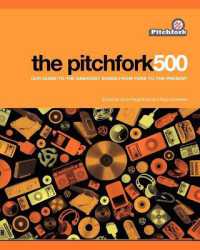- ホーム
- > 洋書
- > 英文書
- > Computer / General
Full Description
This book meets the present and future needs for the interaction between various science and technology/engineering areas on the one hand and different branches of soft computing on the other. Soft computing is the recent development about the computing methods which include fuzzy set theory/logic, evolutionary computation (EC), probabilistic reasoning, artificial neural networks, machine learning, expert systems, etc. Soft computing refers to a partnership of computational techniques in computer science, artificial intelligence, machine learning, and some other engineering disciplines, which attempt to study, model, and analyze complex problems from different interdisciplinary problems. This, as opposed to traditional computing, deals with approximate models and gives solutions to complex real-life problems. Unlike hard computing, soft computing is tolerant of imprecision, uncertainty, partial truth, and approximations.
Interdisciplinary sciences includevarious challenging problems of science and engineering. Recent developments in soft computing are the bridge to handle different interdisciplinary science and engineering problems. In recent years, the correspondingly increased dialog between these disciplines has led to this new book.
This is done, firstly, by encouraging the ways that soft computing may be applied in traditional areas, as well as point towards new and innovative areas of applications and secondly, by encouraging other scientific disciplines to engage in a dialog with the above computation algorithms outlining their problems to both access new methods as well as to suggest innovative developments within itself.
Contents
Chapter 1. Recent Trends in Interval Regression: Applications in Predicting Dengue Outbreaks.- Chapter 2. Fuzzy-Affine Approach in Dynamic Analysis of Uncertain Structural Systems.- Chapter 3. Fuzzy Application: Develop a Weather Index.- Chapter 4. Type-2 Fuzzy Linear Eigenvalue Problems with Application in Dynamic Structures.- Chapter 5. Fuzzy dynamical system in alcohol related health risk behaviors and beliefs.- Chapter 6. Curriculum Learning Based Artificial Neural Network Model for Solving Differential Equations.- Chapter 7. Analysis of EEG signal for drowsy detection: A machine learning approach.- Chapter 8. Uncertain Structural Parameter Identification by Intelligent Neural Training.- Chapter 9. Soft-Computing Tools embedded on Internet-of-Things can enhance Cyber Security.- Chapter 10. Security issues on IoT communication and evolving solutions.- Chapter 11. Causality and Its Applications.- Chapter 12. Hybrid Evolutionary Computing based Association Rule Mining.- Chapter 13. Towards Sarcasm Detection n Reviews - A dual parametric approach with Emojis and Ratings.







